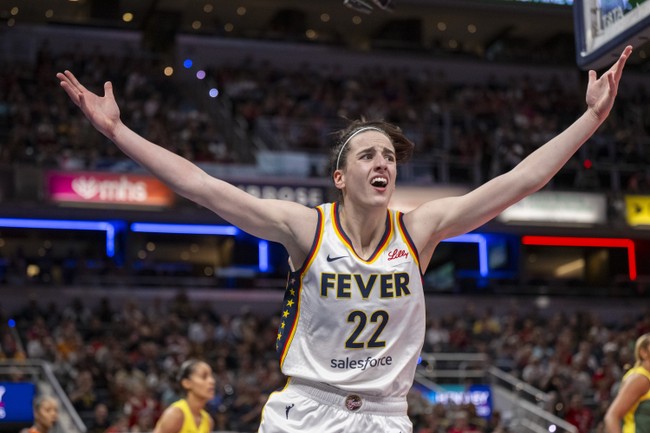
I’ve got an admission to make. When I wrote about Caitlin Clark discussing her “white privilege” recently, I figured it would take a little while before my claim that it would only make things worse was vindicated. Surprise, though, it only took two days.
SEE: Caitlin Clark Bends the Knee to the Race Grifters, and It’ll Never Be Enough
The original story centered on an interview that Clark did with TIME after she was named “Athlete of the Year.” In it, the WNBA phenom dismissed the idea that she had earned her way, instead citing her supposed “white privilege” as the reason she has been so successful. She then went on to claim the WNBA was “built on the backs” of black women.
“I want to say I’ve earned every single thing, but as a white person, there is privilege,” she is quoted in the Time writeup. “A lot of those players in the league that have been really good have been Black players. This league has kind of been built on them.”
As I noted in my commentary, you can never be woke enough, and by bending the knee to the racial grievance mob, Clark was only inviting more criticism. Sure enough, she’s getting it.
Sheila Johnson, owner of the Washington Mystics, chimed in by claiming that TIME shouldn’t have given Clark the award, stating that it promotes “racism” within the league.
Mystics Owner dismisses Caitlin Clark’s impact on the WNBA and suggests the TIME cover should have been the entire league.
This is why you don’t play the racial grievance game. It’s a losing affair no matter how much you give in.
— Bonchie (@bonchieredstate) December 13, 2024
“Why couldn’t they have put the WNBA on that cover and say, ‘The WNBA is the league of the year,’ because of all the talent that we have,” Johnson said. “When you single out one player, it creates hard feelings, so now you’re starting to hear stories of racism within the WNBA, and I don’t want to hear that.”
Johnson went so far as to claim that Clark’s attention and the minting of the term “the Caitlin Clark effect,” which has been associated with the attention she has brought to the league, is because of race.
“It’s the way media plays out race,” Johnson said. “I feel really bad, because I’ve seen so many players of color that are equally as talented, and they never got the recognition they should have.”
CNN took a similar tune after Clark’s interview, with Bakari Sellers claiming that a failure to admit “white privilege” means you’re a “white supremacist” who is threatened by equality.
Somehow, Bakari Sellers starts talking about “white supremacy” in attacking white people who refuse to do what Caitlin Clark has done in acknowledge their “white privilege” and their success in life is built and owed to black people pic.twitter.com/LuSyIRUecX
— Curtis Houck (@CurtisHouck) December 13, 2024
Returning to Johnson’s comments, she wasn’t done. She went on to assert that Clark was not primarily responsible for the WNBA’s increase in viewership and popularity in 2024, citing Angel Reese.
She also noted that the recent success of the WNBA isn’t solely due to Clark, stating: “It’s Angel Reese as well.
“We have so much talent out there that has been unrecognized. I don’t think we can just pin it on one player.”
Is that true? Is it the other unrecognized talent in the WNBA that’s driving the success of the league? Luckily, we don’t have to guess because we have hard numbers.
The Mystics played 20 home games during the 2024 season. Of those, Caitlin Clark played in just two of them as a member of the Indiana Fever. Guess how much of the Mystics’ total attendance was produced by those two games? That would be 31 percent. Think about how awful the team’s normal attendance had to have been for that to be true.
Never mind that the WNBA itself still lost $40 million in 2024 despite record ratings and attendance. Maybe the owner of the Mystics should be more concerned about that than slighting the one player who is unquestionably a net positive for the league.
Johnson’s comments were petty and unfactual, dripping with her own racist biases. Clark earned “Athlete of the Year,” not the entire WNBA. The numbers prove that. It was not a matter of “white privilege,” and the decision by Clark to give in to the pressure has, as predicted, only led to more criticism and disrespect. Once again for those in the back: You can never be woke enough.
